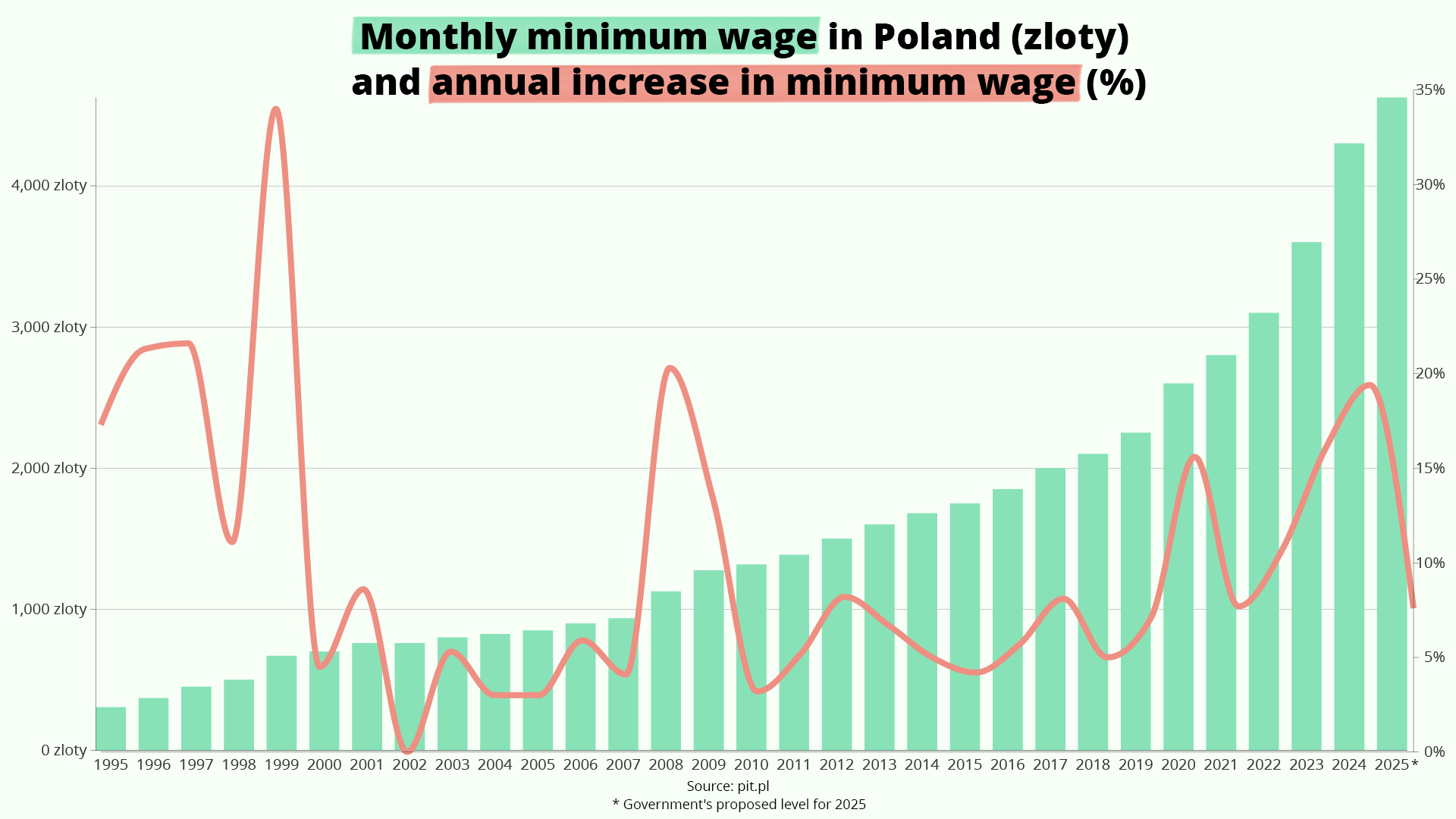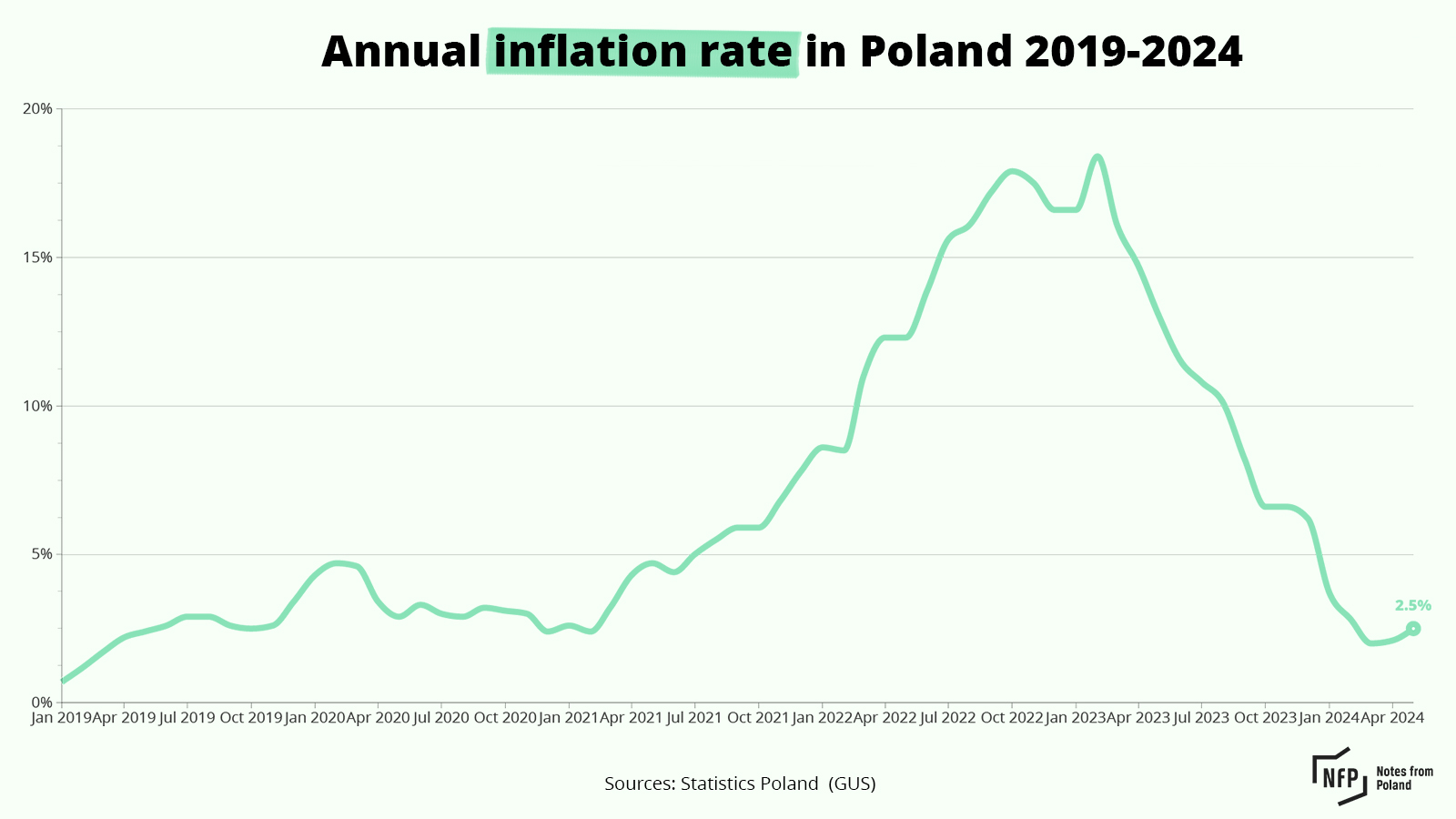Poland’s government has approved a proposal to raise the monthly minimum wage to 4,626 zloty (€1,059) gross next year, which would mark a 7.6% increase.
It is the first decision regarding the minimum wage level made by Prime Minister Donald Tusk’s cabinet, which took office in December. And it has been cautiously welcomed by both business and trade union figures, who will now take part in consultations with the government to agree the final level of the rise.

Currently, the minimum wage in Poland is 4,242 zloty (€975.65) gross but from 1 July it will rise to 4,300 zloty (€988.99), in line with increases approved by the previous government last year.
The increase proposed by Tusk’s government marks a slowdown from large rises in the last two years – of 19.4% in 2024 and 16.1% in 2023 – that were linked to extremely high levels of inflation following the COVID pandemic and outbreak of war in neighbouring Ukraine.
High levels of inflation, which peaked at 18.4% in February last year, also meant that increases in the minimum wage were made twice a year.
Under normal economic conditions, the minimum wage only increases at the start of the year. But when projected inflation for the year is above 5%, there is a statutory requirement for it to rise twice a year. The government forecasts inflation of 4.1% for next year, meaning a return to a one-off minimum wage rise in January.

As well as planning to increase the monthly minimum wage by 7.6% to 4,626 zloty gross, the government also wants the hourly minimum wage to rise 7.5% to 30.20 zloty (€6.91) from the start of 2025. It is estimated that 3.1 million people will benefit from the monthly and hourly minimum wage increases.
The proposed increases are lower than the labour ministry’s original idea to raise the minimum wage to 60% of the average wage. In the first quarter of 2024, the average salary was 8,147 zloty (€1,872) gross. A minimum wage at 60% of this amount would come to approximately 4,888 zloty (€1,123) gross.
That proposal, however, was criticised by some businesses and economists, who said that the macroeconomic environment, especially the slowdown in inflation, does not support this level of a hike.
Real wages rose 8.9% in Poland in January, which was the fastest growth for almost 16 years.
For more, read our full report here:https://t.co/5qmYNASDnL pic.twitter.com/OB7kwdQRKX
— Notes from Poland 🇵🇱 (@notesfrompoland) February 20, 2024
Yesterday, business representatives welcomed the abandonment of the idea of pegging the minimum wage to the average wage.
“It was complete nonsense for us, especially as inflation…[which] is the main reason and criterion for raising the minimum wage…has fallen below 5%,” Łukasz Bernatowicz, president of the BCC employers association, told newspaper Dziennik Gazeta Prawna.
“Therefore it is absolutely not justified to increase the minimum wage further by leaps and bounds,” added Bernatowicz, who is also deputy chair of the Social Dialogue Council, which brings together employers, unions and the government to negotiate the final level of the minimum wage.
Poland was one of only two EU countries to record a positive consumer confidence index in February.
It has also seen the bloc’s largest rise in confidence over the last year https://t.co/JfhbZ7Mzq3
— Notes from Poland 🇵🇱 (@notesfrompoland) March 1, 2024
Piotr Ostrowski, chairman of the All-Poland Alliance of Trade Unions (OPZZ), told Dziennik Gazeta Prawna that he was pleased the government had abandoned its initial idea to calculate the 2025 minimum wage increase based on its current level rather than the higher rate being introduced next month.
He also noted that the unions had called for an 8.14% increase in 2025. “The difference [from the government’s proposal] is not big, so I hope that we will be able to reach an agreement at the Social Dialogue Council.”

Notes from Poland is run by a small editorial team and published by an independent, non-profit foundation that is funded through donations from our readers. We cannot do what we do without your support.
Main image credit: Jeriden Villegas / Unsplash

Alicja Ptak is senior editor at Notes from Poland and a multimedia journalist. She previously worked for Reuters.



















